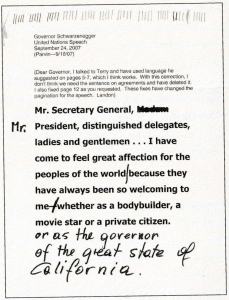What could be worse than a Grammarian role?! Poking finger into people’s mistakes? Sounds dull and unexciting. Moreover, for many Toastmasters English is not a native language. Personally, I’ve learned it in a very strange way–practice separately, grammar separately. And I don’t shy away from creative English. I routinely use the verb ‘to guineapig’ for testing done scientifically. Once I used ‘unmisoverestimateable’ to slow down one crazy daisy manager. (If you wonder what does it mean–something so grandiose, that it cannot be overestimated by mistake. I warned you about my English!) So, during two years in the club, I took the Grammarian role only once. It was impossible to dodge it in the legacy Competent Leadership Manual.
This time it was different. This time I jump on the role of Grammarian. I need it to collect the flush royale of Toastmasters roles. No way to dodge. But, could I make it a useful and fun experience? What could be great in this role? Why does this role exist at all? It struck me that I was looking at this role from the wrong standpoint. I was pondering “Whats?” of the role, while the right question to ask was “Why?” In essence, the Grammarian is an educational role. Its scope is to help people improve their English. This “Aha!” moment brought me “Why?” Then “How?” and “What?” came easy.
I decided to make the experience of English grammar fun and educational. Recipe? Take a Word of the Day. Mix with spotting predictable mistakes, season with an education mini-session. Top up with good examples from participants. My Word of the Day session was longer than usual. I linked it to the speech topics–persuasive speaking–and chose the word “coax”. I employed a dynamic Powerpoint Slide to bring pronunciation and examples. That was an hors d’oeuvres. The main course was spotting mispronunciation and running an education mini-session. While “foreign accent is a sign of bravery,” it is also quite predictable, especially when you know who is talking. It was very easy to capture a couple of examples. Next, I did a trick. Instead of playing the blame games and lambasting mistakes, I offered a way to improve. Dictionaries offer great pronunciation functionality, both in Oxford Learner’s Dictionary for British English and Merriam-Webster for American English. There is a wonderful poem “The Chaos,” which highlights all complex pronunciation cases. Last but not the least, I hunted for good expressions used by speakers and paraded my trophies in the final evaluation. “Motivation gets you going, but discipline keeps you growing” was one example, which resonated strongly with the speech topics–persuasive speaking.
It worked amazingly well! People were quite happy to learn something new. I reached the goal of my role–to help people improve their English in an encouraging and supportive manner. I learned a lesson–start with “Why?” and frame it properly. Choosing a particular means of “How?” and “What?” is easier when “Why?” is clear. And I have just Toastmaster of the Evening to complete my flush royale of roles.



